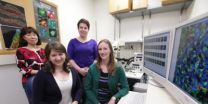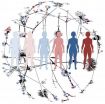(Press-News.org) Influential policy-informing 'evidence' that children's brains are irreversibly 'sculpted' by parental care is based on questionable evidence.
The researchers warn that the success that advocates of 'brain-based' parenting have had in influencing government policy could undermine parent-child relationships.
The study identified that although there is a lack of scientific foundation to many of the claims of 'brain-based' parenting, the idea that years 0-3 are neurologically critical is now repeated in policy documents and has been integrated into professional training for early-years workers.
Dr Jan Macvarish, a Research Fellow at Kent's Centre for Parenting Culture Studies, analysed the policy literature for the study.
She said: 'What we found was that although the claims purporting to be based on neuroscience are very questionable, they are continually repeated in policy documents and are now integrated into the professional training of health visitors and other early years workers. "Brain claims" entered a policy environment which was already convinced that parents are to blame for numerous social problems, from poverty to mental illness.
'The idea that these entrenched problems will be solved by parents being more attentive to their children's brains is risible. Although aimed at strengthening the parent-child relationships, these kinds of policies risk undermining parents' self-confidence by suggesting that "science" rather than the parent knows best.'
The study highlights that mothers, in particular, are told that if they are stressed while pregnant or suffer postnatal depression, they will harm their baby's brain.
'This dubious information is highly unlikely to alleviate stress or depression but rather more likely to increase parental anxiety,' said Dr Macvarish. 'Parents are also told they must cuddle, talk and sing to their babies to build better brains. But these are all things parents do, and have always done, because they love their babies.
'Telling parents these acts of love are important because they are 'brain-building' inevitably raises the question of how much cuddling, talking and singing is enough? Such claims also put power in the hands of 'parenting experts' and ultimately risk making parenting a biologically important but emotionally joyless experience.'
INFORMATION:
The study, titled The Uses and Abuses of Biology: Neuroscience, Parenting and Family Policy in Britain, was co-authored by Dr Macvarish and Dr Ellie Lee of Kent's School of Social Policy, Sociology and Social Research and Dr Pam Lowe, of Aston University. It was funded by the Faraday Institute's Uses and Abuses of Biology programme.
The key findings will be presented at a conference on 28 March. See: http://blogs.kent.ac.uk/parentingculturestudies/files/2010/12/Uses-and-Abuses-of-Biology-final-programme.pdf
Neuroscience 'used and abused'
2014-03-19
ELSE PRESS RELEASES FROM THIS DATE:
NRL researchers detect water around a hot Jupiter
2014-03-19
Scientists at the Naval Research Laboratory (NRL) are part of a research team that has detected water vapor in the atmosphere of a planet outside our solar system. The team, including scientists from California Institute of Technology, Harvard-Smithsonian Center for Astrophysics, Pennsylvania State University, and University of Arizona, applied a sophisticated Doppler technique to the infrared to directly detect the planet and demonstrate the presence of water in its atmosphere. The discovery is described in the March 10, 2014 issue of The Astrophysical Journal Letters.
The ...
Vanderbilt diabetes researchers track cells' ability to regenerate
2014-03-19
Vanderbilt University scientists have found evidence that the insulin-secreting beta cells of the pancreas, which are either killed or become dysfunctional in the two main forms of diabetes, have the capacity to regenerate.
The surprising finding, posted online recently by Cell Metabolism, suggests that by understanding how regeneration occurs, scientists one day may be able to stop or reverse the rising tide of diabetes, which currently affects more than 8 percent of the U.S. population.
The study "provides clues to how we might learn what signals promote beta-cell ...
Critical illness increases risk of psychological problems
2014-03-19
Fortunately, more and more people survive critical illnesses and accidents. A new Danish-American survey shows, however, that hospitalisation where the patient has received mechanical ventilation can have serious consequences:
- Of course, the good news is that more and more patients survive critical illness and treatment using ventilators. But at the same time, the bad news is that we have now documented that the ventilator patients have a considerable risk of developing psychological problems.
The first few months after discharge are really critical, says professor ...
Multidisciplinary research team led by Tufts CTSI proposes new model for clinical trials
2014-03-19
BOSTON (March 19, 2014) – Experts across academia, industry and government propose a new method for health care providers to get the right treatments to the right patients at the right time. This new approach, A Proposal for Integrated Efficacy-to-Effectiveness (E2E) Clinical Trials, published in Nature Clinical Pharmacology & Therapeutics, recommends a seamless transition from controlled experiments to real-world comparative effectiveness trials. This continuum will improve the accuracy of treatment selection and better determine how those treatments work on different ...
Lied-to children more likely to cheat and lie
2014-03-19
People lie – we know this. People lie to kids – we know this, too. But what happens next? Do children who've been lied to lie more themselves?
Surprisingly, the question had not been asked experimentally until Chelsea Hays, then an undergraduate student in psychology at the University of California, San Diego, approached professor Leslie Carver with it. Now the pair have a paper out in Developmental Science, suggesting that adult dishonesty does make a difference, and not in a good way.
"As far as we know," said Carver, associate professor of psychology and human development ...
Small step towards growing tissue in the lab
2014-03-19
University of Adelaide mathematicians have devised a method for identifying how cell clusters have formed by analysing an image of the cluster.
Published in the Journal of Theoretical Biology, their mathematical modelling tool will be useful in helping biologists and tissue engineers to move towards growing human tissue such as liver in the laboratory.
"When any tissue or organ develops, the cells have to organise themselves into the correct structure," says Dr Edward Green, researcher in the University's School of Mathematical Sciences. "This self-organisation process ...
Ancient DNA shows moa were fine until humans arrived
2014-03-19
A study by Curtin University researchers and colleagues from Denmark and New Zealand strengthens the case for human involvement in the disappearance of New Zealand's iconic megaherbivore, the moa - a distant relative of the Australian Emu.
All nine species of New Zealand moa, the largest weighing up to 250 kilograms, became extinct shortly after Polynesians arrived in the country in the late 13th century.
Researchers have previously suggested, from limited genetic evidence, that huge populations of moa had collapsed before people arrived and hence influences other ...
No-refrigeration, spray vaccine could curb diseases in remote areas
2014-03-19
DALLAS, March 19, 2014 — A new kind of single-dose vaccine that comes in a nasal spray and doesn't require refrigeration could dramatically alter the public health landscape — get more people vaccinated around the world and address the looming threats of emerging and re-emerging diseases. Researchers presented the latest design and testing of these "nanovaccines" at the 247th National Meeting & Exposition of the American Chemical Society (ACS), the world's largest scientific society.
Their talk was one of more than 10,000 presentations at the meeting, being held here ...
Understanding binge eating and obesity
2014-03-19
VIDEO:
In this JoVE video article, a set of methods to measure food-related motivation and values are described in JoVE's peer-reviewed video article format.
Click here for more information.
March 19, 2014 —Researchers at the University of Cambridge have developed a novel method for evaluating the treatment of obesity-related food behavior. In an effort to further scientific understanding of the underlying problem, they have published the first peer-reviewed video of their technique ...
101 liver cancer drug candidates pave the way to personalized medicine
2014-03-19
The heart disease drug perhexiline is one of 101 compounds predicted to prevent cancer growth in most patients suffering from our most common liver cancer, HCC. This is an outcome from a novel simulation-based approach using personal sets of proteins of six HCC patients.
"This is the first time personalized models have been used to find and evaluate new potential drugs," says Professor Jens Nielsen at Chalmers University of Technology.
--
Our most common liver cancer, Hepatocellular carcinoma, HCC, causes more than half a million deaths worldwide every year. If the ...




